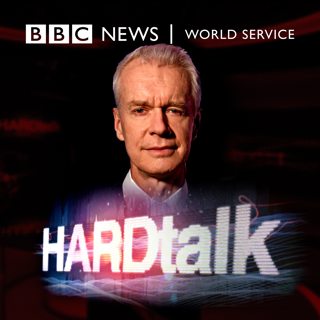
Aleksandar Vučić: Is Serbia looking to the West or Russia and China?
Stephen Sackur is in Belgrade for an exclusive interview with Serbia’s President Aleksandar Vučić. The Balkan country is at a crossroads. Does it prioritise turning westwards, doing all it can to gain EU entry, or face east, deepening an already close friendship with Russia and expanding economic ties with China?
25 Nov 202422min

Masoumeh Ebtekar: Is Iran's leadership in danger of losing its grip?
Stephen Sackur speaks to Iran’s former vice president for women and family affairs, Masoumeh Ebtekar. Despite state repression, many Iranian women are still confronting restrictive laws which they label ‘gender apartheid’. Amid social and economic unrest, is today’s Iranian leadership in danger of losing its grip?
19 Nov 202423min

Paddy Hill: Rebuilding after a miscarriage of justice
This month marks 50 years since 21 people were killed by the IRA in the Birmingham pub bombings. Six men, ‘The Birmingham Six’, were imprisoned for 16 years for murderous bomb attacks which they did not commit. In 2011, Stephen Sackur spoke to one of those men, Paddy Hill. He had been a free man for 20 years, but had he managed to rebuild his life?
18 Nov 202422min

Sir Steve McQueen: The power of film
Stephen Sackur speaks to Steve McQueen, the Oscar-winning director of films including 12 Years a Slave and Widows. Much of his work has portrayed racial injustice, and his latest film, Blitz, tells the story of a black boy caught up in war-torn London in 1940. His images are often difficult to bear - how important is it not to look away?Image: Steve McQueen (Credit: Andy Rain/EPA-EFE/REX/Shutterstock)
15 Nov 202422min

Farah Nabulsi: Challenging imbalance in value of human life
Stephen Sackur speaks to British-Palestinian filmmaker Farah Nabulsi. Her latest film, The Teacher, is set in the West Bank and invites audiences to see and feel the Palestinian experience in intimate, human and emotional detail; but is that possible in the post-October 7th climate of war?
13 Nov 202422min

Edmund Bartlett: Does Jamaica have a security problem?
Stephen Sackur speaks to Jamaica's minister of tourism, Edmund Bartlett. While the island nation projects itself to the world as a Caribbean success story, its reputation is being tarnished by violent crime, drugs and gang warfare. What will it take to make Jamaica more secure?
11 Nov 202422min

Jason Jones: How can you change cultural attitudes?
Allan Little speaks to the Trinidadian human rights activist Jason Jones. He is campaigning to legalise consensual sex for homosexuals on his native island, and hopes that the case will have repercussions for similar laws in other countries. But will it be enough to change cultural attitudes?
8 Nov 202422min

Andrei Kelin: Is Vladimir Putin reshaping geopolitics?
Stephen Sackur speaks to Russia’s ambassador in London, Andrei Kelin. Thanks to the war in Ukraine and allegations of Russian hybrid warfare in Europe and beyond, diplomatic relations between Moscow and the West are poisonous. Is Vladimir Putin right to think he’s reshaping geopolitics?
4 Nov 202422min






















